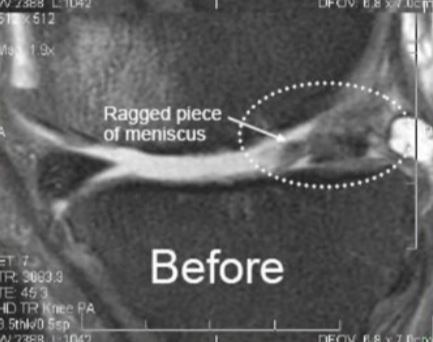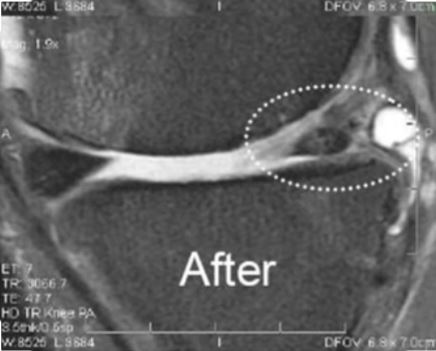Regenexx Treatment for Meniscus Tears
Your Trusted Non-surgical Alternative to Meniscus Surgery
Am I a Candidate?Want to Avoid Meniscus Surgery?
Regenexx’s Non-surgical Treatment for Meniscus Tears is the Trusted Surgery Alternative
If meniscus surgery shouldn’t be your first option, what is the alternative? Much like interventional cardiology has gained a foothold over cardiac surgery over the past few decades, interventional orthopedics is providing nonsurgical alternatives to many orthopedic surgeries available today. And meniscus repair is one of them. The procedure is going by the name “Percutaneous Meniscal Trephination and Implantation,” or the “Perc-MTI,” for short.
This Regenexx procedure is a breakthrough, non-surgical treatment for people suffering from knee pain due to a meniscus tear, or other knee pain resulting from common orthopedic conditions. It is a minimally invasive same-day injection procedure that may help incite healing of the injured tissue and allow the individual to avoid the painful and lengthy recovery that typically follows surgery, as well as the long-term impact to the knee as a result of removing sections of the meniscus.
Not sure if it’s your meniscus that’s bothering you? Learn about our other alternatives to knee surgery >
Meet the Perc-MTI

Types of Meniscus Tears We Treat
Medial Meniscus Tear
A tear on medial meniscus often caused traumatically by sudden changes of direction and force in sports like football, soccer, basketball, volleyball and skiing. They can also be caused by repetitive use injuries like distance running and cycling and degenerative changes to the knee in older patients. Medial Meniscus Tears respond very well to our treatments.
Bucket Handle Meniscus Tear
The entire inner rim of the medial meniscus can be torn in what is called a bucket handle tear. These tears usually occur in an area of good blood supply in the meniscus. While these tears when caught very early are the one case that can be sutured, our injections can accomplish the same thing without the risks and recovery time of surgery.
Complex Degenerative Meniscus Tear
Just like other tissues of the body, the tissue that forms the menisci weakens with age, making the menisci prone to degeneration and tearing with just minor injury or no particular injury at all. These tears of the meniscus are usually seen as a part of the overall condition of osteoarthritis of the knees in older adults and cause the menisci to fray and tear in multiple directions. Thankfully, in these cases, there are so many tears, most surgeons won’t even try to repair them surgically.
Meniscus Flap Tear
The meniscus can also have a flap tear from the inner rim. These tears usually involve a small percentage of the meniscus and do not have the ability to heal on their own because they occur in an area that does not have good blood supply. Flap tears are the type most commonly “trimmed” or “shaved”, (removed) leading to long term issues. BEWARE of any removal of meniscus tissue. Instead use our treatments to heal the tear.
Before and After MRI of Perc-MTI Procedure
Outcomes are important when considering treatment for orthopedic pain. These MRIs show the outcomes of 2 patients that underwent the Perc-MTI procedure – the trusted alternative to meniscus surgery.
Patient 1
Before:

After:

Patient 2
Before:

After:

Frequently Asked Questions
Why should meniscus surgery be your last resort?
Partial knee meniscectomy is a very common surgery that involves removing the torn part of the meniscus, which is a natural shock absorber for the knee. In fact, in America alone, we perform about 700,000 of these surgeries per year, making it one of the most common orthopedic surgeries. While most patients think they’re getting a meniscus repair procedure, in fact, 96% of these surgeries just whack out a piece of the shock absorber, leaving your knee less and not more protected.
If you’re 35 or over, meniscus tears as are as common and about as important as wrinkles. This means that the idea that you hurt your knee and then an MRI shows a meniscus tear and that meniscus tear is causing your pain is no better than chance. This is because many patients over 35 are walking around with meniscus tears and have no pain. Hence, your first job after being told you have a meniscus tear on MRI is deciding whether it’s causing pain!
Your family physician will probably only provide two options: conservative measures to see if the meniscus heals on its own and, if it doesn’t, meniscus surgery. However, you actually have a third option to consider, and that is the interventional orthopedics approach to meniscus tears.
More than 90% of the time meniscus surgery does not actually “repair” the meniscus, but rather removes the torn pieces. Given its shock absorbing function, less shock absorber means more shock gets delivered to the cartilage and bone. After a while, this living tissue reacts, and cartilage is lost, and the knee begins to form new bone spurs. Multiple studies have calculated increased force versus the amount of meniscus removed and its profound negative consequences to the long-term function and stability of the knee. In addition, papers have confirmed that removing parts of the meniscus results in knee arthritis.
Most remarkably, recent research has shown that meniscus surgery, on average, is no more effective than a sham surgery or physical therapy in its positive effects, however physical therapy has no negative impact. Despite this, almost a million meniscectomies are still performed every year.
More Resources
-
6 Meniscus Tear Types And How To Treat Them Properly
Even a small meniscus tear can make walking difficult for you. If you are experiencing any of these symptoms, you may want to seek medical help as soon as possible, depending on the type of tear you have. Needless to say, a lot depends on understanding the meniscus tear types there are and what each…
-
How To Heal A Torn Meniscus Naturally
If you have, or suspect you have a torn meniscus, and you’re wondering how to heal a torn meniscus naturally, you’ve landed on the right post. You may be wondering: Do I need surgery? Can you heal a torn meniscus naturally? The short answer is: It depends. What Is a Meniscus? The meniscus is a…
-
How to Read a Knee MRI for Meniscal Tear
Dr. Chris Centeno discusses how to read a knee MRI for meniscal tears and what you need to know about such tears. Transcript Hi, this is Dr. Centeno. And I’d like to go over today How to Read Your Knee MRI: Focus on the Meniscus. I have a whole series of these and reading a…
-
7 Most Common Symptoms of a Loose Knee Replacement
Walking became impossible. Each step was associated with severe pain. Knee replacement seemed like a good solution. Unfortunately, months after the surgery problems exist. Your doctor thinks you have a loose knee replacement. What is a knee replacement? What causes a knee replacement to become loose? What are the 7 most common symptoms of a…
-
How to Read Knee MRI
Transcript for “How to Read Knee MRI” Hi, this is Dr. Centeno and I’d like to go over how to read knee MRI. I got the idea for this when a friend had a knee injury, got an MRI, was sent home with the CD, and just jumped on the internet to try to figure…
-
“Your Stem Cells Are Too Old” – Fact Or Fiction?
“Your Stem Cells Are Too Old” – A Great Pitch That’s Mostly Fiction Transcript Hey, it’s Dr. Centeno, and I’d like to go over what is a great sales pitch out there but mostly fiction, and that is the concept that you’re just too old to use your own stem cells. And I’ve done this…
Am I a Candidate?
To answer this question, fill out the candidate form below to request a new patient evaluation, and a patient advocate will reach out to you to determine your next steps. Your one-hour, in-office or telemedicine evaluation will be with one of the world’s experts in the field of Interventional Orthopedics.